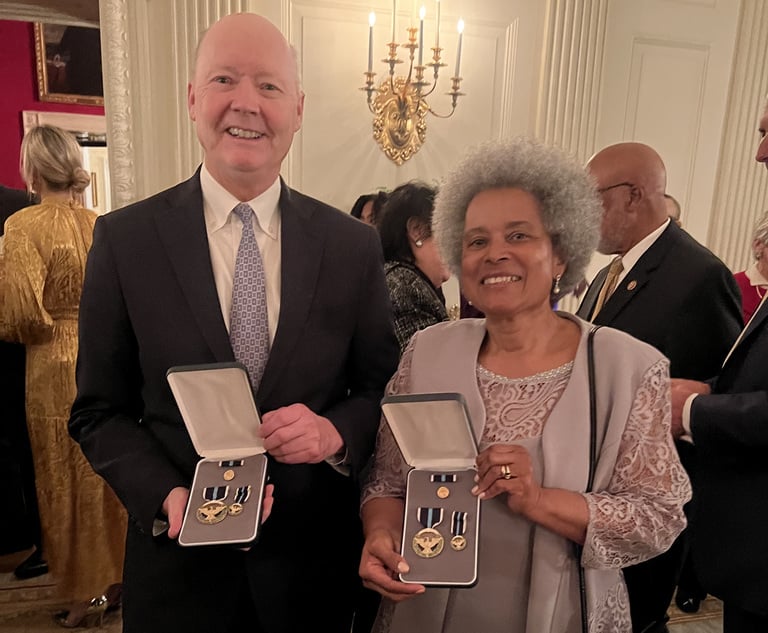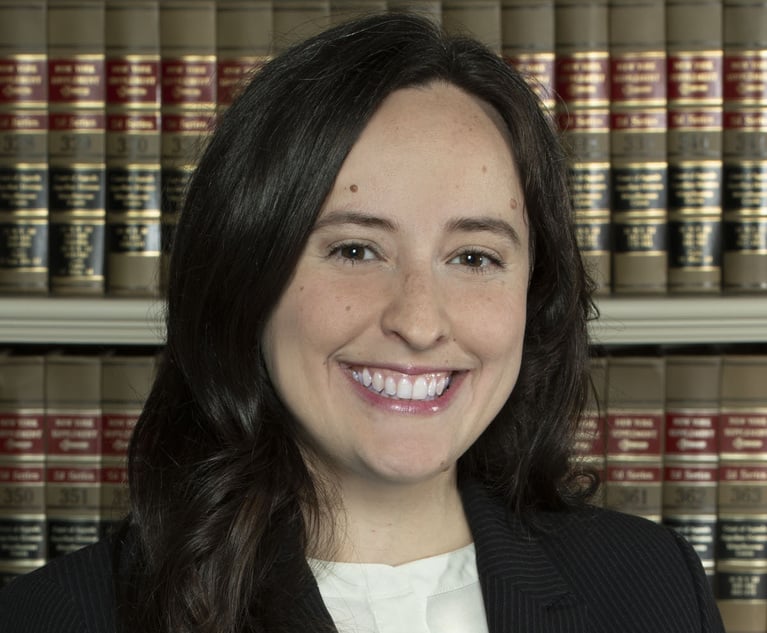Del. Judge Tosses Whistleblower Suit Alleging Medical Industry 'Kickbacks'
A former executive at Medco Health Solutions Inc. who sued the health care company on behalf of the United States, California, Florida and New Jersey for allegedly violating anti-kickback laws lacked immediate knowledge of any wrongdoing, a Delaware federal judge ruled on Tuesday.
October 26, 2017 at 07:03 PM
10 minute read
The original version of this story was published on Delaware Law Weekly

A former executive at Medco Health Solutions Inc. who sued the health care company on behalf of the United States, California, Florida and New Jersey for allegedly violating anti-kickback laws lacked immediate knowledge of any wrongdoing, a Delaware federal judge ruled on Tuesday.
The whistleblower, former Medco vice president of pharmaceutical contracting Paul Denis, had accused the company of defrauding the government by favoring certain drugs in exchange for kickbacks from AstraZeneca disguised as discounts, which the firm failed to disclose with its clients, including health care plans subsidized by Medicare Part D. The lawsuit was brought under the False Claims Act and related state laws.
Denis said Medco had hid its rebates for more than a decade, dating back to the early 2000s, when it spent more than three years litigating a similar suit by the federal government. Medco settled the suit with the United States in October 2006 and entered a corporate integrity agreement with the Department of Health and Human Services and the Office of Personnel Management.
According to the complaint, the government was particularly concerned about the profit-seeking tactics Medco used to disguise and conceal rebates from pharmaceutical manufacturers to avoid its obligations to pass them on to its customers.
Under the agreement, Medco was required to monitor and track all compensation it received on behalf of drugmakers. However, the agreement specifically excluded relatively small discounts from prompt invoice payments, which typically are not shared with clients.
Denis said Medco always knew the AstraZeneca arrangements were intentionally mischaracterized, but allowed the scheme to continue so that it could continue to disguise rebates as purchase discounts.
“Medco intentionally avoided informing the federal government, as well as states, private employers, unions and health plan administrators, of the true price being paid by Medco for the relevant AZ drugs, thus engaging in deceptive and fraudulent [actions] in violation of the CIA, which was imposed upon Medco for other deceptive and fraudulent conduct.
However, the suit gained little traction in the U.S. District Court for the District of Delaware since it was first filed in 2011. Earlier this year, Judge Richard G. Andrews dismissed the case under the first-to-file rule and the public disclosure bar of the False Claims Act, which requires whistleblowers to be an “original source” who could not have learned of supposed wrongdoing from channels outside the company.
The law was amended in 2010 to remove a requirement that whistleblowers have first-hand knowledge of corporate wrongdoing and replaced it with language mandating that the knowledge be independent and more developed than information that is already publicly disclosed.
Andrews wrote that the amended statute has led to an “awkward rule” in cases that cite wrongdoing that both before and after the 2010 changes took place. In the U.S. Court of Appeals for the Third Circuit, he said, courts are forced to essentially bifurcate the claim on the effective date of the 2010 amendments and then evaluate the same claim using both versions of the public disclosure bar.
“From this court's perspective, the better approach would be to apply the pre-2010 public disclosure bar to the entire continuing fraud claim, because that was the statute in effect at the time the claim accrued, and the statute is not retroactive,” he said.
Nevertheless, Andrews found that Denis' claims failed under both versions of the public disclosure bar.
Under the pre-2010 standard, Andrews said, Denis lacked direct knowledge of Medco's alleged scheme because, despite his high-ranking status, he had not negotiated or administered any contracts between Medco and AstraZeneca.
“In other words, the complaint does not allege that Denis saw or heard the information first-hand. For these reasons, Denis has not demonstrated that he qualifies as an original source under the pre-2010 disclosure bar,” Andrews wrote in a 14-page memorandum opinion.
Andrews continued that Denis' complaint lacked any concrete allegations of post-2010 wrongdoing, beyond stating that Medco had renewed its agreements with AstraZeneca from 2011 to 2013.
“These allegations do not add anything significant to the 'who, what, when, where and how' of the fraudulent scheme,” for Denis to qualify as an original source he said, dismissing the case with prejudice.
Attorneys from both sides did not immediately respond to calls requesting comment, and Medco could not immediately be reached for comment.
The United States, Florida, California and New Jersey were represented by Shannon Thee Hanson, Jeffrey A. Wertkin, William E. Olson and Tiphanie P. Miller of the U.S. Department of Justice.
Denis was represented by Jeffrey S. Goddess and P. Bradford deLeeuw of Rosenthal, Monhait & Goddess.
Medco was represented by Rodger D. Smith II of Morris, Nichols, Arsht & Tunnell.
The case was captioned Doe v. Medco Health Solutions.

A former executive at
The whistleblower, former Medco vice president of pharmaceutical contracting Paul Denis, had accused the company of defrauding the government by favoring certain drugs in exchange for kickbacks from AstraZeneca disguised as discounts, which the firm failed to disclose with its clients, including health care plans subsidized by Medicare Part D. The lawsuit was brought under the False Claims Act and related state laws.
Denis said Medco had hid its rebates for more than a decade, dating back to the early 2000s, when it spent more than three years litigating a similar suit by the federal government. Medco settled the suit with the United States in October 2006 and entered a corporate integrity agreement with the Department of Health and Human Services and the Office of Personnel Management.
According to the complaint, the government was particularly concerned about the profit-seeking tactics Medco used to disguise and conceal rebates from pharmaceutical manufacturers to avoid its obligations to pass them on to its customers.
Under the agreement, Medco was required to monitor and track all compensation it received on behalf of drugmakers. However, the agreement specifically excluded relatively small discounts from prompt invoice payments, which typically are not shared with clients.
Denis said Medco always knew the AstraZeneca arrangements were intentionally mischaracterized, but allowed the scheme to continue so that it could continue to disguise rebates as purchase discounts.
“Medco intentionally avoided informing the federal government, as well as states, private employers, unions and health plan administrators, of the true price being paid by Medco for the relevant AZ drugs, thus engaging in deceptive and fraudulent [actions] in violation of the CIA, which was imposed upon Medco for other deceptive and fraudulent conduct.
However, the suit gained little traction in the U.S. District Court for the District of Delaware since it was first filed in 2011. Earlier this year, Judge Richard G. Andrews dismissed the case under the first-to-file rule and the public disclosure bar of the False Claims Act, which requires whistleblowers to be an “original source” who could not have learned of supposed wrongdoing from channels outside the company.
The law was amended in 2010 to remove a requirement that whistleblowers have first-hand knowledge of corporate wrongdoing and replaced it with language mandating that the knowledge be independent and more developed than information that is already publicly disclosed.
Andrews wrote that the amended statute has led to an “awkward rule” in cases that cite wrongdoing that both before and after the 2010 changes took place. In the U.S. Court of Appeals for the Third Circuit, he said, courts are forced to essentially bifurcate the claim on the effective date of the 2010 amendments and then evaluate the same claim using both versions of the public disclosure bar.
“From this court's perspective, the better approach would be to apply the pre-2010 public disclosure bar to the entire continuing fraud claim, because that was the statute in effect at the time the claim accrued, and the statute is not retroactive,” he said.
Nevertheless, Andrews found that Denis' claims failed under both versions of the public disclosure bar.
Under the pre-2010 standard, Andrews said, Denis lacked direct knowledge of Medco's alleged scheme because, despite his high-ranking status, he had not negotiated or administered any contracts between Medco and AstraZeneca.
“In other words, the complaint does not allege that Denis saw or heard the information first-hand. For these reasons, Denis has not demonstrated that he qualifies as an original source under the pre-2010 disclosure bar,” Andrews wrote in a 14-page memorandum opinion.
Andrews continued that Denis' complaint lacked any concrete allegations of post-2010 wrongdoing, beyond stating that Medco had renewed its agreements with AstraZeneca from 2011 to 2013.
“These allegations do not add anything significant to the 'who, what, when, where and how' of the fraudulent scheme,” for Denis to qualify as an original source he said, dismissing the case with prejudice.
Attorneys from both sides did not immediately respond to calls requesting comment, and Medco could not immediately be reached for comment.
The United States, Florida, California and New Jersey were represented by Shannon Thee Hanson, Jeffrey A. Wertkin, William E. Olson and Tiphanie P. Miller of the U.S. Department of Justice.
Denis was represented by Jeffrey S. Goddess and P. Bradford deLeeuw of Rosenthal, Monhait & Goddess.
Medco was represented by Rodger D. Smith II of
The case was captioned Doe v. Medco Health Solutions.
This content has been archived. It is available through our partners, LexisNexis® and Bloomberg Law.
To view this content, please continue to their sites.
Not a Lexis Subscriber?
Subscribe Now
Not a Bloomberg Law Subscriber?
Subscribe Now
NOT FOR REPRINT
© 2025 ALM Global, LLC, All Rights Reserved. Request academic re-use from www.copyright.com. All other uses, submit a request to [email protected]. For more information visit Asset & Logo Licensing.
You Might Like
View All
Fed Judiciary Panel Mulls Authority to Ban In-State Bar Admission Requirements

Delaware Legal Figures Who Played Key Roles in Ending School Segregation Honored With Presidential Citizens Medal
3 minute read

Trending Stories
Who Got The Work
Michael G. Bongiorno, Andrew Scott Dulberg and Elizabeth E. Driscoll from Wilmer Cutler Pickering Hale and Dorr have stepped in to represent Symbotic Inc., an A.I.-enabled technology platform that focuses on increasing supply chain efficiency, and other defendants in a pending shareholder derivative lawsuit. The case, filed Oct. 2 in Massachusetts District Court by the Brown Law Firm on behalf of Stephen Austen, accuses certain officers and directors of misleading investors in regard to Symbotic's potential for margin growth by failing to disclose that the company was not equipped to timely deploy its systems or manage expenses through project delays. The case, assigned to U.S. District Judge Nathaniel M. Gorton, is 1:24-cv-12522, Austen v. Cohen et al.
Who Got The Work
Edmund Polubinski and Marie Killmond of Davis Polk & Wardwell have entered appearances for data platform software development company MongoDB and other defendants in a pending shareholder derivative lawsuit. The action, filed Oct. 7 in New York Southern District Court by the Brown Law Firm, accuses the company's directors and/or officers of falsely expressing confidence in the company’s restructuring of its sales incentive plan and downplaying the severity of decreases in its upfront commitments. The case is 1:24-cv-07594, Roy v. Ittycheria et al.
Who Got The Work
Amy O. Bruchs and Kurt F. Ellison of Michael Best & Friedrich have entered appearances for Epic Systems Corp. in a pending employment discrimination lawsuit. The suit was filed Sept. 7 in Wisconsin Western District Court by Levine Eisberner LLC and Siri & Glimstad on behalf of a project manager who claims that he was wrongfully terminated after applying for a religious exemption to the defendant's COVID-19 vaccine mandate. The case, assigned to U.S. Magistrate Judge Anita Marie Boor, is 3:24-cv-00630, Secker, Nathan v. Epic Systems Corporation.
Who Got The Work
David X. Sullivan, Thomas J. Finn and Gregory A. Hall from McCarter & English have entered appearances for Sunrun Installation Services in a pending civil rights lawsuit. The complaint was filed Sept. 4 in Connecticut District Court by attorney Robert M. Berke on behalf of former employee George Edward Steins, who was arrested and charged with employing an unregistered home improvement salesperson. The complaint alleges that had Sunrun informed the Connecticut Department of Consumer Protection that the plaintiff's employment had ended in 2017 and that he no longer held Sunrun's home improvement contractor license, he would not have been hit with charges, which were dismissed in May 2024. The case, assigned to U.S. District Judge Jeffrey A. Meyer, is 3:24-cv-01423, Steins v. Sunrun, Inc. et al.
Who Got The Work
Greenberg Traurig shareholder Joshua L. Raskin has entered an appearance for boohoo.com UK Ltd. in a pending patent infringement lawsuit. The suit, filed Sept. 3 in Texas Eastern District Court by Rozier Hardt McDonough on behalf of Alto Dynamics, asserts five patents related to an online shopping platform. The case, assigned to U.S. District Judge Rodney Gilstrap, is 2:24-cv-00719, Alto Dynamics, LLC v. boohoo.com UK Limited.
Featured Firms
Law Offices of Gary Martin Hays & Associates, P.C.
(470) 294-1674
Law Offices of Mark E. Salomone
(857) 444-6468
Smith & Hassler
(713) 739-1250






